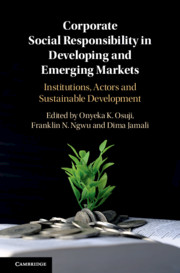 Corporate Social Responsibility in Developing and Emerging Markets
Corporate Social Responsibility in Developing and Emerging Markets from Part I - Institutions, CSR Conceptualizations and Sustainable Development
Published online by Cambridge University Press: 18 December 2019
CSR and sustainability practices play a significant role across diverse sectors of an economy. This chapter examines corporate social responsibility and sustainable development in the informal economy. Through the review of the literature, the chapter establishes that unregistered micro, small, and medium enterprises mainly dominate the informal sector particularly in developing and emerging economies. The low degree of formalisation and other specific attributes common to small and medium enterprises (SMEs) operating in the informal sector, influence their CSR approach and strategies. The chapter discusses the need to build social capital (trust, reputation and legitimacy) and culture as motivating factors that promote SMEs involvement in CSR practices, while legislation and institutional context are major drivers of sustainability practices. The chapter highlights how the informal economy, particularly in the context of SMEs, can be positioned to be more socially and environmentally responsible.
To save this book to your Kindle, first ensure no-reply@cambridge.org is added to your Approved Personal Document E-mail List under your Personal Document Settings on the Manage Your Content and Devices page of your Amazon account. Then enter the ‘name’ part of your Kindle email address below. Find out more about saving to your Kindle.
Note you can select to save to either the @free.kindle.com or @kindle.com variations. ‘@free.kindle.com’ emails are free but can only be saved to your device when it is connected to wi-fi. ‘@kindle.com’ emails can be delivered even when you are not connected to wi-fi, but note that service fees apply.
Find out more about the Kindle Personal Document Service.
To save content items to your account, please confirm that you agree to abide by our usage policies. If this is the first time you use this feature, you will be asked to authorise Cambridge Core to connect with your account. Find out more about saving content to Dropbox.
To save content items to your account, please confirm that you agree to abide by our usage policies. If this is the first time you use this feature, you will be asked to authorise Cambridge Core to connect with your account. Find out more about saving content to Google Drive.